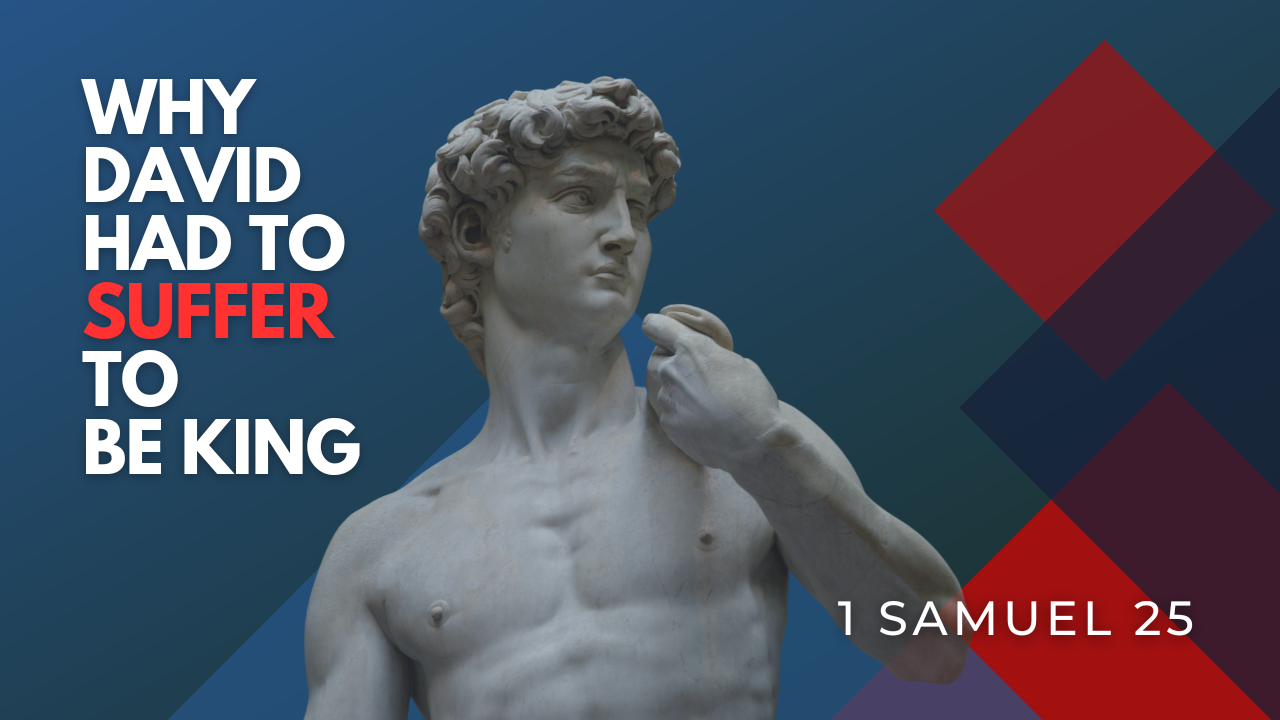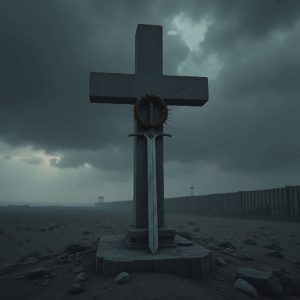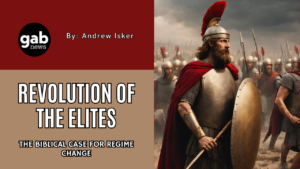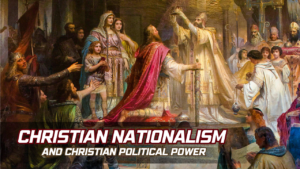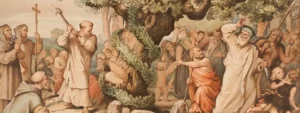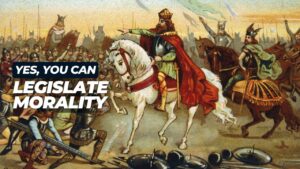After the death of Samuel, the conflict between David and Saul has cooled, but David has other enemies to deal with. A man whom David protected, who owes allegiance to David, refused to supply him and his men, and as a king in waiting, he feels the impulse to respond to this rebellion. But, once again, David is forced to learn patience and allow the Lord to mete out justice, rather than avenging himself with his own hands. In our passage today, we see the good, the bad, and the ugly of becoming a righteous king.
Catch the First Sermon in this series here.
Catch the Second Sermon in this series here.
Catch the Third Sermon in this series here.
Catch the Fourth Sermon in this series here.
25 Then Samuel died; and the Israelites gathered together and lamented for him, and buried him at his home in Ramah. And David arose and went down to the Wilderness of Paran.
1 Samuel 25:1-44
2 Now there was a man in Maon whose business was in Carmel, and the man was very rich. He had three thousand sheep and a thousand goats. And he was shearing his sheep in Carmel. 3 The name of the man was Nabal, and the name of his wife Abigail. And she was a woman of good understanding and beautiful appearance; but the man was harsh and evil in his doings. He was of the house of Caleb.
4 When David heard in the wilderness that Nabal was shearing his sheep, 5 David sent ten young men; and David said to the young men, “Go up to Carmel, go to Nabal, and greet him in my name. 6 And thus you shall say to him who lives in prosperity: ‘Peace be to you, peace to your house, and peace to all that you have! 7 Now I have heard that you have shearers. Your shepherds were with us, and we did not hurt them, nor was there anything missing from them all the while they were in Carmel. 8 Ask your young men, and they will tell you. Therefore let my young men find favor in your eyes, for we come on a feast day. Please give whatever comes to your hand to your servants and to your son David.’ ”
9 So when David’s young men came, they spoke to Nabal according to all these words in the name of David, and waited.
10 Then Nabal answered David’s servants, and said, “Who is David, and who is the son of Jesse? There are many servants nowadays who break away each one from his master. 11 Shall I then take my bread and my water and my meat that I have killed for my shearers, and give it to men when I do not know where they are from?”
12 So David’s young men turned on their heels and went back; and they came and told him all these words. 13 Then David said to his men, “Every man gird on his sword.” So every man girded on his sword, and David also girded on his sword. And about four hundred men went with David, and two hundred stayed with the supplies.
14 Now one of the young men told Abigail, Nabal’s wife, saying, “Look, David sent messengers from the wilderness to greet our master; and he reviled them. 15 But the men were very good to us, and we were not hurt, nor did we miss anything as long as we accompanied them, when we were in the fields. 16 They were a wall to us both by night and day, all the time we were with them keeping the sheep. 17 Now therefore, know and consider what you will do, for harm is determined against our master and against all his household. For he is such a scoundrel that one cannot speak to him.”
18 Then Abigail made haste and took two hundred loaves of bread, two skins of wine, five sheep already dressed, five seahs of roasted grain, one hundred clusters of raisins, and two hundred cakes of figs, and loaded them on donkeys. 19 And she said to her servants, “Go on before me; see, I am coming after you.” But she did not tell her husband Nabal.
20 So it was, as she rode on the donkey, that she went down under cover of the hill; and there were David and his men, coming down toward her, and she met them. 21 Now David had said, “Surely in vain I have protected all that this fellow has in the wilderness, so that nothing was missed of all that belongs to him. And he has repaid me evil for good. 22 May God do so, and more also, to the enemies of David, if I leave one male of all who belong to him by morning light.”
23 Now when Abigail saw David, she dismounted quickly from the donkey, fell on her face before David, and bowed down to the ground. 24 So she fell at his feet and said: “On me, my lord, on me let this iniquity be! And please let your maidservant speak in your ears, and hear the words of your maidservant. 25 Please, let not my lord regard this scoundrel Nabal. For as his name is, so is he: Nabal is his name, and folly is with him! But I, your maidservant, did not see the young men of my lord whom you sent. 26 Now therefore, my lord, as the Lord lives and as your soul lives, since the Lord has held you back from coming to bloodshed and from avenging yourself with your own hand, now then, let your enemies and those who seek harm for my lord be as Nabal. 27 And now this present which your maidservant has brought to my lord, let it be given to the young men who follow my lord. 28 Please forgive the trespass of your maidservant. For the Lord will certainly make for my lord an enduring house, because my lord fights the battles of the Lord, and evil is not found in you throughout your days. 29 Yet a man has risen to pursue you and seek your life, but the life of my lord shall be bound in the bundle of the living with the Lord your God; and the lives of your enemies He shall sling out, as from the pocket of a sling. 30 And it shall come to pass, when the Lord has done for my lord according to all the good that He has spoken concerning you, and has appointed you ruler over Israel, 31 that this will be no grief to you, nor offense of heart to my lord, either that you have shed blood without cause, or that my lord has avenged himself. But when the Lord has dealt well with my lord, then remember your maidservant.”
32 Then David said to Abigail: “Blessed is the Lord God of Israel, who sent you this day to meet me! 33 And blessed is your advice and blessed are you, because you have kept me this day from coming to bloodshed and from avenging myself with my own hand. 34 For indeed, as the Lord God of Israel lives, who has kept me back from hurting you, unless you had hurried and come to meet me, surely by morning light no males would have been left to Nabal!” 35 So David received from her hand what she had brought him, and said to her, “Go up in peace to your house. See, I have heeded your voice and respected your person.”
36 Now Abigail went to Nabal, and there he was, holding a feast in his house, like the feast of a king. And Nabal’s heart was merry within him, for he was very drunk; therefore she told him nothing, little or much, until morning light. 37 So it was, in the morning, when the wine had gone from Nabal, and his wife had told him these things, that his heart died within him, and he became like a stone. 38 Then it happened, after about ten days, that the Lord struck Nabal, and he died.
39 So when David heard that Nabal was dead, he said, “Blessed be the Lord, who has pleaded the cause of my reproach from the hand of Nabal, and has kept His servant from evil! For the Lord has returned the wickedness of Nabal on his own head.”
And David sent and proposed to Abigail, to take her as his wife. 40 When the servants of David had come to Abigail at Carmel, they spoke to her saying, “David sent us to you, to ask you to become his wife.”
41 Then she arose, bowed her face to the earth, and said, “Here is your maidservant, a servant to wash the feet of the servants of my lord.” 42 So Abigail rose in haste and rode on a donkey, attended by five of her maidens; and she followed the messengers of David, and became his wife. 43 David also took Ahinoam of Jezreel, and so both of them were his wives.
44 But Saul had given Michal his daughter, David’s wife, to Palti the son of Laish, who was from Gallim.
The Rich Fool (25:1-14)
Samuel has died. While he was not the high priest in name, during this time when the tabernacle was torn apart, and the High Priest Eli’s line had been all but wiped out, he served as the de facto high priest. This is very important to how Israelite society functions. When the high priest dies, the land reverts to its original ancestral owner, and exiles who had fled to a city of refuge are able to return to the land. The ritual meaning of the death of the high priest becomes very important here in David’s story. He has been an exile on the run from Saul, who is pursuing him like an avenger of blood.
After mourning for Samuel, David and his men went to the wilderness of Paran. There we are introduced to a very rich man from the tribe of Judah named Nabal, which literally means “Fool.” Now, if the Bible calls your name “Fool” it doesn’t take an expert in biblical symbolism to discern what it might be communicating to us about him. He had a beautiful wife named Abigail, which means “My Father Rejoices.” Her father maybe rejoiced that his son-in-law was extremely wealthy, but not that much since he was an idiot and very wicked.
David heard that Nabal was going to Carmel to shear his sheep, so David took the opportunity to request his kinsman’s support. It might seem like David is trying to shake the rich guy down, but later on in the story, we discover that Nabal’s men understand how dangerous it was out there, bands of Philistines raiding constantly, that they were certain David’s men—who stayed with them the entire time—had protected them from certain death. Sending your men to shed their blood for this guy comes at a cost, and Nabal is stiffing him.
When David’s men ask for support, Nabal scoffs at them. He calls David a runaway slave. “Should I have to feed every slave who runs away from his master?” Nabal is making a calculated decision. He knows that Saul reigns and that he probably still has it out for David, even though there seems to be a temporary peace. And that if he stiffs David, it’s not like he’s stiffing Saul on his taxes. If he refused to pay Saul, Saul would likely come and kill him. But David isn’t king. Saul is. Therefore, I don’t owe him a thing, and there’s nothing he’s going to do about it.
But what happens? David’s men return and tell him about Nabal’s treachery, and David immediately offers a laconic response: “every man gird his sword.” And 400 of his 200 men set out to destroy Nabal and his household.
Lady Wisdom (v. 15-35)
One of Nabal’s young men tells his wife Abigail what he has done, and how David had protected them, and that they know David is going to seek retribution. So Abigail, without her husband’s knowledge, sent donkeys full of bread, wine, grain, fruit, and sheep to supply David and his men. As David travels to Nabal, he makes a vow, saying that he will not leave alive one person who urinates against the wall (what it says literally in the Hebrew).
Abigail meets David, pleads with him to restrain his hand, and then tells him of her faith in all that Yahweh is going to do for him. Abigail also knows that God is going to make David the king and that God is clearing out all of David’s enemies so that he won’t have to avenge himself or kill without moral justification. Abigail, at this moment, has more faith in God’s plan for David than David does. He was going to avenge himself. In terms of realpolitik, it makes perfect sense that he would do this. He is a Judahite tribal warlord protecting the lands of his kinsmen, and one of the richest, who has benefited the most from his blood being shed, has refused to pay for services rendered.
So David makes a vow saying he would have killed Nabal and his men if she had not intervened. You’ll notice he doesn’t renege on his original vow but keeps its intent. Then he tells her to go in peace.
The Fool Meets His End (v. 36-44)
Nabal had held a feast, pretending to be a king. He was too drunk for her to tell him what had happened. Instead of his heart being merry with wine, the Lord had turned his heart to stone, and ten days later, he would be dead. David’s response to the news of Nabal’s death was rejoicing. He was glad God had killed him and prevented David from sinning. It might be difficult for us to grapple with because modern American manners tell us never to be happy when anyone, even an evil person dies, but the Bible doesn’t teach that at all. There are all sorts of examples like this of God’s people celebrating when the wicked are destroyed. If you were happy that the monstrous Ruth Bader Ginsburg finally breathed her last and the Supreme Court ruling, which allowed millions of dead babies, could be repealed, you were not sinning, even if our culture looks down on that kind of thing.
The story ends with a wedding. Now, David, of course, was already married. It is unclear if Saul divorced his daughter from David before or after his marriage to Abigail, but even if he did, we see David taking two wives here besides Michal. Nevertheless, the point about Samuel dying comes into play here. David is an exile who is returning to the Land, and now he marries a beautiful, rich widow who owns a ton of land. His returning to the Land, like an exile from a city of refuge, is a preview of him coming into his kingdom.
Conclusion
There is an awful lot we can take away from this passage. Most people focus on David being a hothead or how important it is to have a wise woman by your side. Those things are, of course, very true, but they aren’t the main theological point of the passage here. What is? We see for the second chapter in a row (out of three) David being forced to wait for God to avenge him against his enemies. The point of the story is a king learning patience.
Why is this story about a guy named “Fool” sandwiched in here between two encounters with Saul? Because it is God giving David proof of concept. David has had the opportunity to strike out against Saul and has refused it, to the dismay of his men, and is going to be given a second opportunity in the next chapter. He resisted the temptation the first time, and Saul was going to break the peace and pursue David again, and God is going to give Saul into his hands once more. David very easily could try to rectify his mistake and kill Saul, sinning grievously and causing God to destroy his kingdom before it even begins. Instead, God gives David tangible evidence that if he just waits for Him instead of taking vengeance for himself, God will take care of his enemies for him.
Now how does this apply to us? Much in every way. As we sit here today, the enemies of faithful Christian people abound. They hold power over every institution in all of life, and they wield it with an iron fist. And our greatest temptation in all of this is impatience. When we turn on the news, when we see the latest outrage online, we cry out, “Why, O Lord! Why do you allow these people to do these things!?” Each week we see abominations celebrated that our ancestors would have burned people alive over. Why is nothing happening? Why don’t the good guys have any power? Unlike David, we aren’t even in a position to be able to avenge ourselves, but say that we were.
We are not ready.
We are in this position because, like David, we have to learn patience.
Just think if we did have power. Just think if we did control important institutions. Look who our leaders would be. We would have powerful evangelical leaders who have proven to the world what craven cowards they are when they are out of power. Every prominent evangelical leader today turns himself into a pretzel whenever he is asked what the Bible says about homosexuality. Nearly all of them said we have to “weep with those who weep” after the Supreme Court told women who want to murder their baby it is not actually a constitutional right. If the leaders we currently have were thrust into power, we would very quickly be in a worse state than we are right now.
So what is God doing? He is clearing them out just as he cleared out the wicked rulers and powerful people in Israel during this time. If you remember all the way around to the beginning of 1 Samuel, there was another faithful, godly woman, Hannah, Samuel’s mother. And her song was the entire theme of this book! That God is going to wipe out the proud and mighty and wicked, and raise up the godly and humble and righteous to rule. You are living in an almost identical moment as that. So the lesson for us is to be patient. To not give in to despair like David gave in to rage. To trust that God really is in control and that He is raising up Davids and Jonathans to replace the Elis and Sauls, and Nabals. And that takes time. It takes generations to pass. But every once in a while, just like in this passage, God gives us little glimmers of hope, glimmers of the future. We’ve seen several of those just in the past year. And our gracious Lord continues to give us hope.
So the charge to you is this: trust in the Lord to accomplish what He is doing, and above all else, learn to be patient. In the Name of the Father, the Son, and the Holy Spirit. Amen!

Andrew Isker is the pastor of 4th Street Evangelical Church in Waseca, MN. He is a graduate of Minnesota State University and Greyfriar’s Hall Ministerial Training School, and he has served churches in Missouri, West Virginia, and Minnesota. He is the author (with Andrew Torba) of Christian Nationalism, and the author of the forthcoming book, The Boniface Option. Andrew, his wife Kara, and their five children reside in his hometown of Waseca, MN. He can be found on Gab @BonifaceOption.

